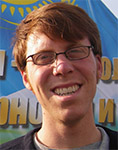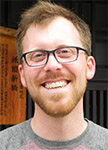Talking with Tim Suchsland (Kazakhstan)
Where and when did you serve in the Peace Corps, and what was your Peace Corp project assignment?
Kazakhstan, 2007-09 — I was a TEFL teacher in a village near the Russian border called Yavlenka.

Tim as a PCV
Tell us about where you lived and worked.
Yavlenka is in northern Kazakhstan about 50 miles from the Russian border and 1.5 hours from a city called Petropavl. The village was a regional center so it had quite a bit of activity and business for rural Kazakhstan. It was also a big agricultural area so lots of farming in the area. The landscape was fairly flat where the Kazakh steppe met the West Siberian Plains.
I lived with host families my entire time in the PC. During training, I lived with a Kazakh family. My first year in Yavlenka I also lived with a Kazakh family of 5. In my last year, I lived with a Russian babushka (old woman).
What kind of work did you do?
I was an English teacher in a Russian language school. I taught students from grades 4 to 11.
What is your educational background?
I received my bachelors degree from the University of Nevada/Reno in history and art, and I graduated in 2007. After the Peace Corps, I returned and received a masters in counseling and educational psychology in 2011.
Did your college education help you as a PCV?
Besides a basic understanding in English, no, my degree didn’t specifically help me. My degree did help me understand the cultural and historical context of my PC assignment. The former Soviet Union has a deep and complicated history. My educational background helped me better appreciate this. I had also studied abroad in Spain and Germany while I was an undergrad. Those two experiences helped me with having a deeper cultural awareness of the world, and practice in patience and flexibility.
How was it going into the class the first day with the language training you had ?
Since I had a local counterpart, who I team taught classes with, it wasn’t too difficult teaching class with my language skills. We mostly only spoke English when teaching, but she would explain things in Russian on certain things like grammar or definitions to our students. Training did a good job that I was able to speak well enough by the time I left for service, though I struggled with listening and comprehension. That would plague me for a lot of the time I was in Kazakhstan. Russian and Kazakh are difficult languages to learn. The real challenge after training was just my inexperience with teaching. I was a novice for sure, so I had to learn a lot on the job.
How long did it for you to take to feel comfortable with it?
With the language? While in training I was in the Russian cohort. (Russian was the lingua franca of Kazakhstan.) I enjoyed learning it but it is definitely a tough language to learn. I learned a few Kazakh phrases too but I found that I mostly needed Russian to get around. By my 2nd year of service I was feeling pretty good about my language skills. Living with a babushka who didn’t speak any English helped tremendously. We watched a lot of Russian soap operas too, and that helped my Russian.
As for teaching, that took me a while to get used too. During training, a majority of the time we were in language classes, so less time was devoted to the job training. After the first year, I was getting more comfortable with the work. The two years of experience teaching there really helped in my post Peace Corps career. .
What have you done since the Peace Corps?
I have been a school counselor since 2011 in the Seattle area. I am also an artist.
What are you doing now?

Tim – 2022
I still work a 9-5 as a school counselor. It’s a great job and I enjoy working with students.
 How would you describe your book in one sentence?
How would you describe your book in one sentence?
A Five Finger Feast: Two Years in Kazakhstan, Lessons from the Peace Corps is a collection of coming-of-age stories set to the backdrop of Kazakhstan, with the ups and the downs, the excitement and the thrill of living abroad as a young person, and working in the Peace Corps.
What prompted you to write the book?
Since I was a history major, I learned to love to write. In the PC, I would write long emails to family and friends. I tried to make them informative and interesting reads. From these emails, I decided to put my creative/artistic talents to use, and in 2012, I began writing my book. In 2013, I also began the illustrations for the book. I thought these drawings would add details to the book that writing just couldn’t show the reader.
How long did it take for you to write your book?
About 10 years from start to finish. During my PC service, I would write long emails home to people. I was also one of the editors for the PC/Kazakhstan newsletter. Some of my stories in my book were influenced by this work.
In 2012, I moved to Seattle and I had a summer with a lot of downtime, so I began writing most of my stories then. I also used to have a ferry commute to work, so during my downtime on the boat I would work on the stories. Many hours of writing the book happened on my iPhone on the ferry to Kingston, WA. Most of the stories were finished around 2018, and it took me a few years to edit and finalize my work. This past year I made a push to publish.
Tell about your writing process. (When, how long each day, what time, hand-written vs computer, in your pj’s or clothes, etc.
In 2012, I wrote a lot of the book at the Greenlake Seattle Starbucks. I was new to town and I had a summer break, so it was a good way to get me out of my house for a few hours each morning. After my initial writing phase in 2012, my process was fairly piecemeal and scattered. Whenever I had a few minutes here or there on a ferry commute to work, I would write. In fact, a lot of the book was written on my iPhone on the Kingston-Edmonds ferry.
During the writing process did you belong to a writers group and share reading and critiquing, or have any other way of bouncing off you writing and thinking?
I would share some of the stories with friends who would give me feedback.
How do you plan to promote your book?
My book will be sold in Third Place Books, a local Seattle chain of bookstores. On Amazon, the book has somehow been classified as India travel, even though Kazakhstan is definitely not India. It has been the #1 new release for India travel for the past two weeks!
Where does the title come from?
The title is a reference to beshbarmak, the national dish of Kazakhstan. It roughly translates from Kazakh as “five fingers.” Essentially, it is boiled mutton with giant noodles that you eat with your hands. It was a dish I ate a lot while I was there, and it was served at many celebration feasts. For me, beshbarmak came to symbolize Kazakhstani hospitality.
Your book is nicely illustrated with your drawings. Do you do any other art work besides for yourself? For other books, other types of illustration?
Yes, I have done commissions, and I illustrated a book for an author that was never published. A lot of my art is for myself, though. The illustrations in the book were mostly drawn around 2013-14 and made with the intent of being in my book. You can check out more of my art at TimSuchslandArt.com.
Thank you Tim.
Congratulations, Tim, on your book and your challenging service. I had a Khazak student some years ago and her English was excellent and she had a nice upbeat vibe. Good on ya! Eric Madeen